
Serving Humanity with Empathy – Ahmadi Muslim Doctors
Official Transcript of Keynote Address by Hazrat Khalifatul Masih V (aba) at the Ahmadiyya Muslim Medical Association International Conference 2024
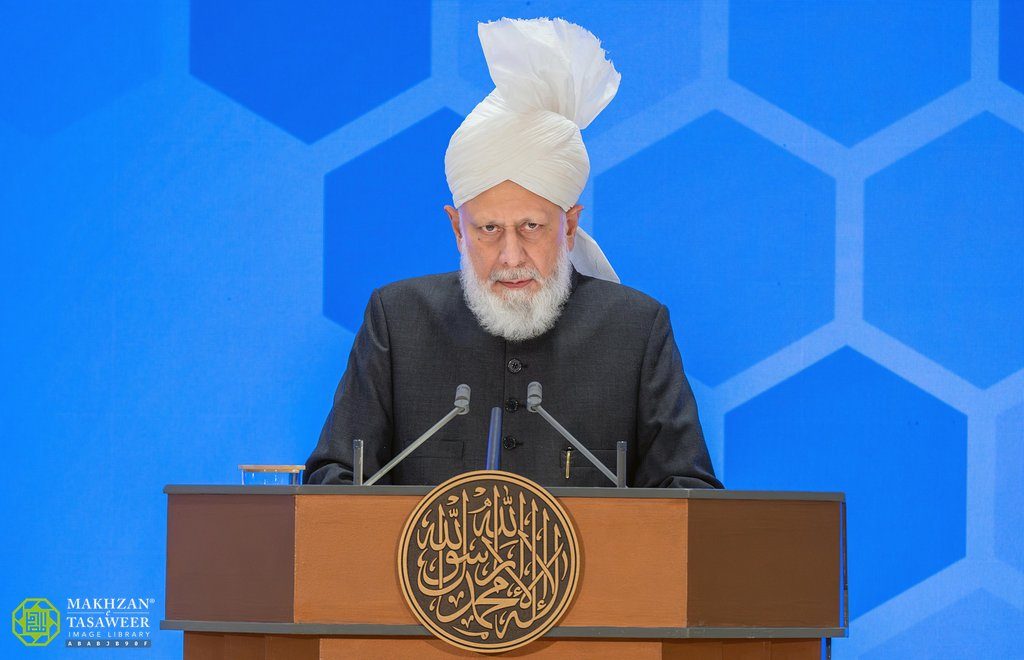
*Please note that this transcript may not be reproduced without express permission either on other websites or in print format.
After reciting Tashahhud, Ta`awwuz and Bismillah, His Holiness, Hazrat Khalifatul Masih V (aba) said:
‘Alhamdulillah, [all praise belongs to Allah] I am pleased that Ahmadi doctors from around the world have joined together at this conference to collaborate and explore new and better ways to fulfil the objectives of the Ahmadiyya Muslim Medical Association.
Apart from sharing your own experiences, I am sure you will have presented ideas and developed plans for broadening the scope of your activities and services worldwide. Certainly, I hope and pray that you have formulated concrete plans or will formulate concrete plans to enhance your support for the Jama’at’s [Community’s] medical institutions and to further your efforts to serve humanity. Furthermore, I hope you will have contemplated how you can extend help and be of benefit to vulnerable Ahmadis who are battling illness or facing health challenges.
With the grace of Allah, our medical associations in some countries are doing excellent work. For example, according to the reports I receive, Australia Jama’at’s medical association is ahead of others in treating patients and equipping Jama’at hospitals with essential equipment and machinery. Whenever I have referred any case to them for their expertise and advice, they have, without hesitation, either pledged to treat the individual, finance the cost of their treatment, or to consult on behalf of the patient with relevant experts and ensure that every avenue is explored to provide them with relief and support. Similarly, they provided a significant amount of medical equipment to our hospitals in Africa and Rabwah. Moreover, for several years, they have provided medical assistance to Ahmadi refugees living in countries such as Malaysia, Thailand, and the Philippines whilst their asylum cases are pending.
Their unwavering commitment to serving those facing hardship and displacement embodies the spirit of service inherent to our faith as Muslims. They have been able to achieve all of this even though the medical association in Australia is not especially large and nor are our doctors there particularly affluent. Yet, they have provided such valuable service as a result of their sincere desire to serve others and through meticulous planning, strategic collaboration, and the efficient utilisation of their resources. May Allah the Almighty reward them and bless their efforts. Ameen.
Thus, always remember that true service lies not in how much we have, but in how much we are willing to give and sacrifice for the sake of others.
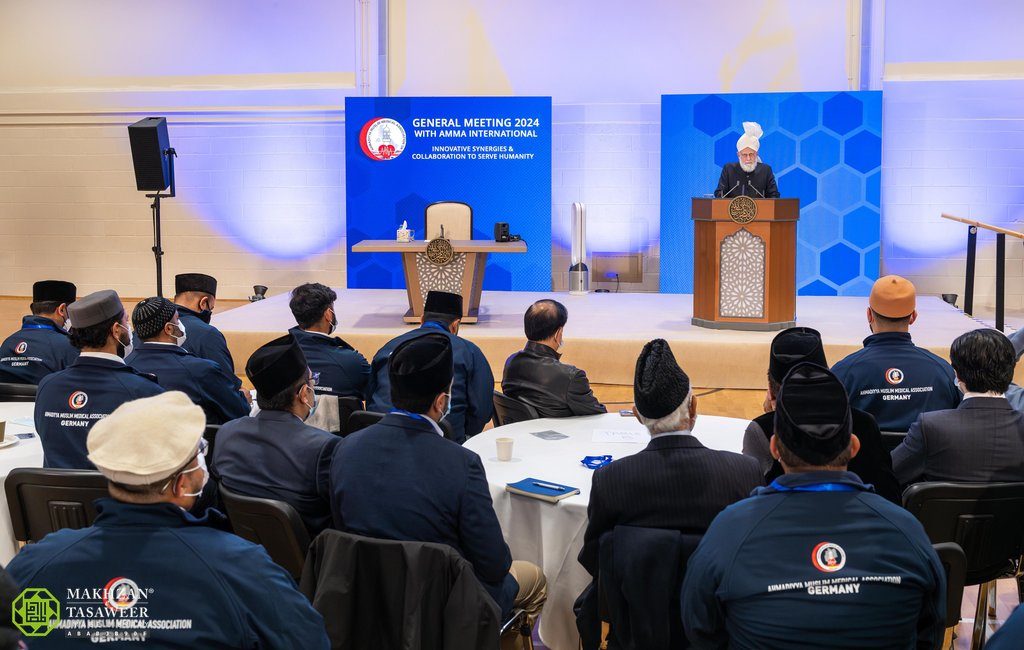
Alhamdulillah, our Ahmadi doctors in the United States have also demonstrated a longstanding commitment to serving the Jama’at’s healthcare initiatives. They played a pivotal role in the construction of the Tahir Heart Institute in Rabwah. In this way, they directly contributed to the first-rate cardiac care that the hospital has provided to countless individuals since its opening. In addition, they have continued to support the institute by providing essential medical machinery and equipment that has helped ensure the hospital’s continued growth and effectiveness.
Furthermore, with the grace of Allah, two or three Ahmadi doctors from the USA have displayed extraordinary dedication for many years by travelling to Rabwah regularly to perform surgeries and provide exceptional treatment to patients at the Tahir Heart Institute. Unquestionably, they are serving the Jama’at with the spirit and devotion expected of a Waqif-e-Zindagi [life-devotee]. May Allah also reward them immensely for their service.
Moving forward, and in addition to the work you are currently undertaking, I now urge the Ahmadiyya Muslim Medical Association in the United States and other countries to focus on raising the standards of the Fazl-e-Omar Hospital in Rabwah. Indeed, the ambition and objective should be for the Fazl-e-Omar Hospital to become a genuine centre of medical excellence. To achieve this, new buildings will need to be constructed, and existing buildings will need to be renovated. Furthermore, modern medical equipment and machinery will need to be procured. More doctors, nurses, and ancillary staff will need to be recruited and trained. Therefore, I urge all of you to reflect upon this and consider how you can leverage your skills, expertise, and resources to elevate the Fazl-e-Omar Hospital in a way that it becomes a genuine centre of excellence. If you can achieve this objective, you will not only impact the lives of countless individuals today but will also leave a lasting legacy for generations to come, insha’Allah [God willing].
In recent years, many Ahmadis have migrated abroad from Pakistan, and most of those left behind are not affluent. In fact, many are living in real hardship. Given the ever-rising costs of medical treatment, it is impossible for such people to afford even basic medical care. As a Jama’at, we consider Khidmat-e-Khalq [service to humanity] to be our religious duty. We consider it our obligation to try to alleviate the suffering of those in need. Consequently, a significant portion of Sadr Anjuman’s budget is allocated to helping such people and their families and insha’Allah, we will always continue to extend such help.
At the same time, the medical association of the Jama’at should consult and proactively engage with the relevant officials of the hospital administration and Nazarat-e-Sehat [Department of Health] in Rabwah and formulate a comprehensive strategic plan for the short-term and long-term development of Fazl-e-Omar Hospital. The plan should address key areas, such as infrastructure improvement, acquisition of modern medical equipment, recruitment and training of skilled personnel, and the establishment of additional specialised departments to cater for the wide-ranging healthcare needs of the community.
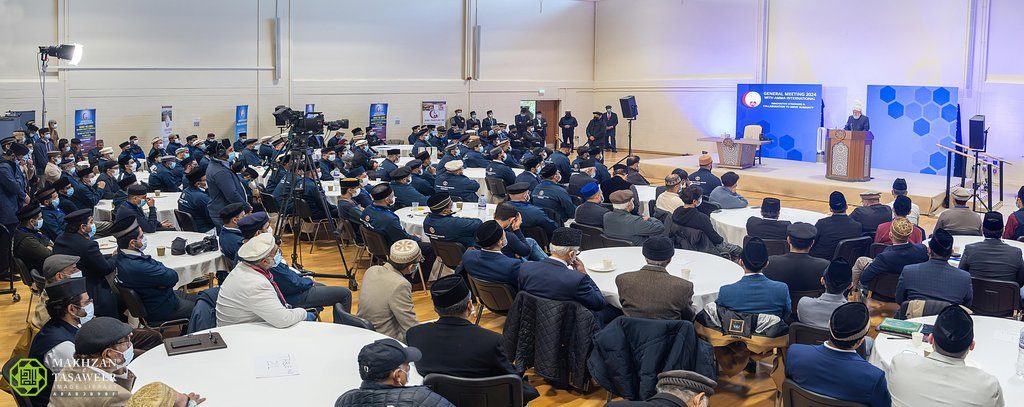
Many Ahmadi doctors themselves have expressed their opinion that the Fazl-e-Omar hospital should be developed into a state-of-the-art facility. Yet, it is not sufficient to merely suggest this; rather, as doctors and as a medical association, you should be at the vanguard of translating this aspiration into a reality. So, you should work diligently on this project and send me your proposals.
One distinguishing feature of Ahmadi doctors in the United States is that apart from serving as physicians, many are also engaged in medical research, seeking to advance the boundaries of human knowledge and healthcare. Similarly, in Germany, some Ahmadi doctors and scientists are significantly contributing to advancement in cardiology. For example, they are developing and manufacturing stents at a very low price. Initial results have been extremely promising and the stents are proving of benefit to patients. The German Ahmadi doctors and scientists are also travelling to Rabwah and Africa with great sincerity to treat patients and provide healthcare to the local people. May Allah reward them immensely and further enhance their knowledge and understanding.
Perhaps some Ahmadi doctors or medical professionals elsewhere are also engaged in similar research but have not informed the Markaz [headquarters]. Anyway, those Ahmadis engaged in medical research should extend their fields of study to investigate the specific healthcare challenges faced by those living in economically deprived countries. Explore innovative solutions, develop cost-effective treatments, and strive to contribute to the development of sustainable healthcare systems that cater to the needs of the most vulnerable populations.
Moreover, as I have stated many times, the world’s geopolitical situation is extremely precarious, and we are living in a time of grave uncertainty. Conflicts and wars are rapidly escalating, and if, God forbid, a world war erupts, the resulting humanitarian crisis would be of an unimaginable scale. While we continue to pray that such a war may be averted, we must also ensure that we have planned for all eventualities. Therefore, I urge our medical associations in the United States and elsewhere to proactively develop comprehensive contingency plans. They should detail how our Ahmadi doctors and medical teams could efficiently utilise their skills and expertise to serve humanity in the event of a global crisis.
Moving on, regarding the efforts of the UK medical association; some years ago, they pledged to build a hospital in the Ivory Coast. However, as the actual scope of the project dawned on them, they developed reservations about whether they could build and run such a hospital. In the end, they withdrew from the project, although they contributed some amount. Thereafter, Humanity First took ownership of the hospital project. Nonetheless, Humanity First has expressed its disappointment that the UK medical association withdrew completely and did not fulfil its pledge. Irrespective of what happened in the past, I hope and pray that the hospital in Ivory Coast is soon completed and that it proves to be a means of providing high-quality healthcare to the local people, insha’Allah.
The key to the success will be ensuring its sustainability, as the hospital is due to house various departments and provide a range of treatments and procedures. It is unlikely that the hospital will be self-sufficient in the near future, as it is being built in an economically deprived country where most people will be unable to pay the cost of their treatment. Accordingly, where Humanity First is exploring ways to ensure its long-term sustainability, I hope the UK Jama’at Medical Association has not entirely washed its hands from this project. Rather, even if it is no longer involved in the construction of the hospital, the UK medical association can and should make a valuable contribution post-construction.
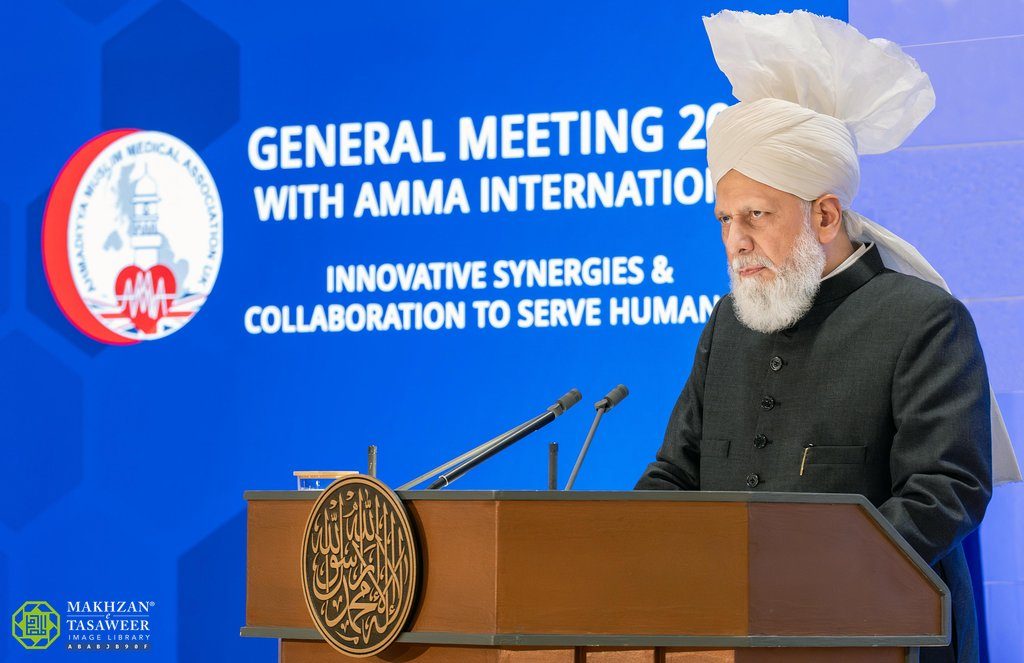
One practical and impactable way to contribute is to arrange for Ahmadi doctors and medical professionals to travel to the Ivory Coast regularly to offer their services as a Waqif-e-Arzi doctor. This would not only reduce some of the financial burden, but also ensure that the hospital has a strong foundation of medical expertise, enabling it to thrive and serve the community effectively, insha’Allah.
After this experience, you should not think it is unrealistic or beyond your capabilities to build such hospitals in Africa or other developing regions. In recent times, Majlis Ansarullah UK has constructed the Masroor Eye Institute in Burkina Faso and also built a general hospital. With the grace of Allah, Ahmadi doctors, including eye specialists from the UK are travelling there regularly to offer their services and to train local doctors. Those travelling from the UK are not just doctors from Majlis Ansarullah [Elder’s Auxiliary Organisation], but also include doctors from Khuddamul Ahmadiyya [Youth Auxiliary Organisation] and Lajna Ima’illah [Women’s Auxiliary Organisation]. In my view, they have been motivated and inspired to offer their service more through the efforts of Majlis Ansarullah rather than the UK dedical association.
Certainly, to ensure a constant flow of Ahmadi doctors, travel to such countries as a Waqf-e-Arzi [temporary period fo devotion] doctor requires a sustained effort, and I think there has been a deficiency in the consistency in the efforts made by the administration of the UK Medical Association in this regard.
This weekend, the UK medical association has hosted this conference, and I am sure it has been well organised – and I can see it seems to be well organised – and the delegates from abroad will have been well looked after. However, remember that the true measure of our success lies not in the conferences we host, but in the impact we have on the world. Your objectives extend far beyond these walls, reaching into the most remote and deprived communities around the world. As such, the UK Medical Association should work passionately and diligently to fulfil its objectives of serving mankind throughout the year and strive to be a standard bearer for medical associations in other Jama’ats to learn from.
You should arrange for Ahmadi doctors to travel abroad at regular intervals to serve in our hospitals and continually find new avenues to expand your service for humanity. You should inspire other Jama’at medical associations and serve as a role model for them. I am not saying Ahmadi doctors in the UK are not offering their services; in fact, I am aware of many dedicated Ahmadi doctors from here who are striving to serve humanity with sincerity and compassion, and I pray that Allah may reward them abundantly for their efforts.
However, remember that collective action is the means of amplifying one’s impact. Similarly, I hope and pray that the Ahmadiyya Medical Association in those countries I have not individually mentioned continually strive to increase their efforts to serve those in need, both within our Jama’at and beyond.
May Allah the Almighty enable all Ahmadiyya Medical Associations to not only develop ambitious plans for serving humanity but also to translate those plans into tangible actions.
At the end, I wish to remind every Ahmadi doctor and medical professional that as an Ahmadi, you should always keep at the forefront of your mind that apart from fulfilling the rights of Allah, you are in a unique position to be on the frontline of serving humanity and fulfilling the rights of Allah’s creation. Do not take this lightly. Instead, consider this a huge privilege and opportunity to gain the nearness and blessings of Allah the Almighty. Never tire or waver in your service for others, and constantly seek new ways to contribute, to innovate, and to expand your reach.
May it be that in the coming months and years ahead you are able to demonstrate a profound and extraordinary increase in your efforts to fulfil the objectives for which the Ahmadiyya Muslim Medical Association was established. Never forget that your skills, knowledge, success, and experience are all gifts from Allah and will only be worthy of value in His eyes when utilised with selflessness for the sake of serving His creation.
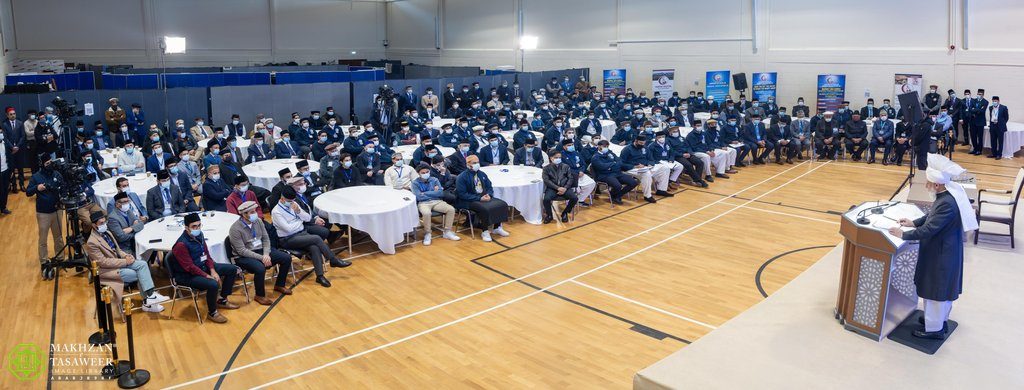
May Allah the Almighty enable you to not only develop new ideas and schemes to serve humanity but also, more importantly, to fulfil them. May you serve those in need with passion, empathy, tenderness, and compassion. May you serve Allah’s creation with devotion purely to gain His pleasure and blessings in the knowledge that whatever blessings Allah has bestowed upon you should be utilised in the service of others.
May all of you prove to be faithful servants of humanity, Ameen, JazakAllah [may Allah bless you].’



